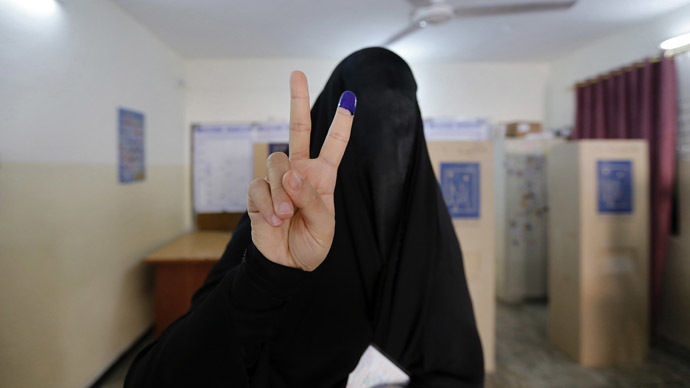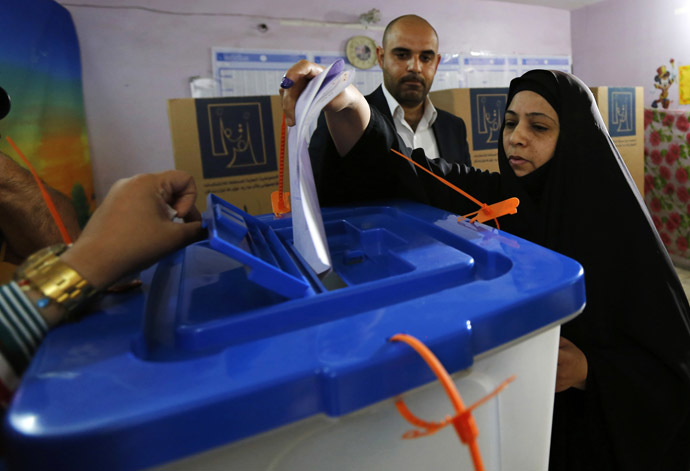Iraq election could bring Sunni and Shia reconciliation

The looming Iraqi elections are going to bring not only new challenges but are likely to ameliorate relations between Sunni and Shia political leaders, as well as improve stability, ex-Marine Cpl. Jake Diliberto told RT.
RT:This is the worst violence Iraq has seen in several years. Why do the government's efforts to contain it seem to be failing?
Jake Diliberto: The Iraqi government is suffering from a couple of different things that penetrate its society inside the government and in the day-to-day life of Iraqis. Basically there have been about a hundred years of sectarian divide between the Sunnis and the Shias… it’s going back to the founding of state in the 1920s. As a result, this political tension, even after the US intervention in 2003, has still found a way to permeate society and increase violence. The reason that the government is ineffective is because of long-term traditional problems within the sectarian communities and also because of US inability to bring political results after the post-2003 invasion. So a combination of the two – history and US intervention.
RT:You fought in the Iraq war. Do you think the invasion helped the country in any way, and what is your view on military interventions in general?
On April 30 Iraq is holding its first ever parliamentary elections since the withdrawal of US troops. However, the sectarian tensions in the country are extremely high, while Iraq itself is a fragmented state, and these facts do affect the ongoing voting. Though security level was increased significantly, the two days before elections were shaded by a wave of deadly attacks.
JD: It’s funny to look at the modern security environment that Iraq faces, and Syria and Lebanon face…. it’s increasingly apparent that third party interventions are not working out for the benefit of Iraqis, Syrians, and Lebanese. These kinds of sectarian solutions need to come from within, they need to come from domestic political resolutions and they need to come from the international community, pushing this sort of thing through the UN and through the Security Council, but how it works in neo-imperial colonial style through coercion and force, it doesn’t seem to have worked so far very well in Iraq, Afghanistan, Syria or other places. I don’t think that tradition is going to change in the very near future.
RT:What impact has the civil war in Syria had on the security situation in Iraq?
JD: Indeed. It’s interesting to see that the sectarian violence in Iraq bled over into Syria after the Bashar Al-Assad regime had its political squabbles. And as a result, Iraq has bled over Syria and rebels have increasingly gained the territory, and there is an increasingly porous border with Turkey that the Syrian civil war has then penetrated back into Iraq. Just to quote Muqtada al-Sadr, very famous Shia militant leader, he has said that Al-Qaeda, Al-Sham, and the Islamic State of the Levant are everywhere, in every corner of the street. Syria has bled over in Iraq, Iraq has bled over in Syria and the problem cannot be seen as an Iraqi problem or a Syrian problem. Now the problem of the Islamic State of the Levant and Islamic State of Al-Sham is a regional problem.

RT:A general election is coming up, what do you think the outcome will be?
JD: The looming political elections going on in Iraq are going to bring two possible problems and two possible very good events. The first problem, that is the biggest problem, could be the increasingly sectarian tensions that would be further dividing society. The other problem is that Al-Qaeda could demonstrate itself as a power force by bombing election cycles, intimidating communities, and as a result, some groups may want to boycott the elections out of fear. This occurred in 2005 most prominently. The two good things to come, if in fact that it is a fair and relatively diplomatic election, you will see increasing cooperation between Sunni and Shia political leaders. The other positive thing that could occur is greater stability in the country. I definitely think that Al-Qaeda will make a stand, some people will be intimidated. So it’s likely that we are going to have some violence, it is likely there is going to be some corruption, but it is also likely that the political establishment in Iraq is going to try to stand for communities and not to be pressured by extremists.
The statements, views and opinions expressed in this column are solely those of the author and do not necessarily represent those of RT.
The statements, views and opinions expressed in this column are solely those of the author and do not necessarily represent those of RT.












